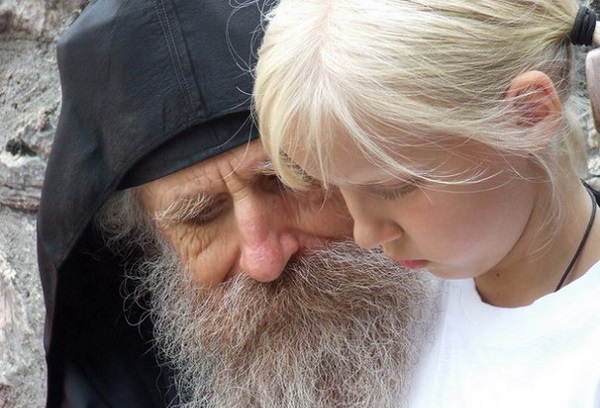Fatherhood in the Church is fatherhood of ineffable humility
9 March 2017[Previous post: http://bit.ly/2l68AAC]
How does the Church present this fatherhood to people and how does it teach them about it in such a way that it once again projects the sanctity of a life which has not been destroyed by egotism, and also so that people can be reborn through spiritual birth into eternal life? Its whole being speaks of it, as does the whole of its methodology and its theanthropic attitude to people and to the world. Fatherhood in the Church, whether it’s the paternity of God, the charismatic paternity of the Prophets, the Apostles, the holy Fathers or the spiritual father, isn’t a fatherhood of authority, tyranny or domination of the human conscience and soul, but fatherhood in the pangs of childbirth, fatherhood of ineffable humility and sacrifice of oneself for the love of others[1].

If physical birth creates an unbreakable bond between the father who begets and the child who is begotten, how much more true is this true of spiritual birth, of which natural birth is but a faint symbol. For spiritual fatherhood to be genuine, there has to be a sharing not only in the glory and authority of Christ, but also in the Cross, death, the terrible descent into Hell, the alienation from God. Only someone who shares in the Cross and glory of Christ is in a position to become a spiritual father, that is someone who shares the fatherhood of God, and thus the only begetter, reformer and educator of human souls. When Adam and Eve trampled upon the commandment, they spat upon the Cross and its mystery in their desire to become gods and rulers of the world. So they forced people and the world into atheism and tyrannical self-will. By performing the will of His Father, Christ, the new Adam, embraced the Cross and became the Begetter, Renewer, and Educator of the new humanity, which gathered and continues to gather in the Father, through the Son, by the Holy Spirit. In their imitation of Christ, the same is true of all the Prophets, Apostles, Saints and Spiritual Fathers, for whom dominion, authority, fatherhood, guidance and training other people aren’t violence and tyranny against them, but love, great enough to endure the Cross and Resurrection for their sake. This is love which asks nothing for itself nor does it misappropriate anything, but rather is crucified through the crucifixion and self-emptying of Christ. This is why only Christ-like spiritual fathers can truly give new birth to and can educate their spiritual children.
One of these innumerable spiritual fathers is the Apostle Paul. Imitating Christ in word and deed, he says he feels the pangs of maternal love: ‘My children, for whom I am again in the anguish of childbirth until Christ is formed in you’ (Gal. 4, 19) and adds: ‘For though you have countless guides in Christ, you do not have many fathers. For I became your father in Christ Jesus through the gospel (I Cor. 4, 15). Paul, then, does not become a new Father ‘on earth’; Christ expressly condemned earthly paternity (‘And call no man your father on earth’, Matth. 23, 9). The apostle is an ‘image’ of heavenly fatherhood, the sole and unique paternity, the charismatic bearer of it, in contradistinction to the Word of God, for Whom God the Father is Father by nature. So if Christ calls God ‘Father’, by nature, the Apostle and anyone who has been adopted through His Son, calls Him this by grace. This distinction is made by Christ Himself, when He says: ‘I am ascending to my Father and your Father’ (Jn. 20, 17)[2]. As ‘heir of God through Christ’ (Gal. 4, 7), heir to this fatherhood in heaven, that is as a Christ-bearer and son by grace, Saint Paul reveals the Father to us, through himself, so that, once we have welcomed the Holy Spirit into our hearts, we, too can cry out ‘Abba, Father’ (Gal. 4,7). This is why he boldly challenges all Christians: ‘Become imitators of me, as I am of Christ (I Cor 11, 1; cf. I Cor. 4, 15).
(to be continued)






